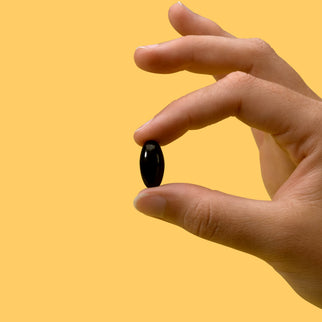Academic burnout is a phrase that can send a shiver down the spine of any college student. You've probably heard it tossed around in dorm rooms and study lounges, often accompanied by tales of endless all-nighters and coffee-fueled cram sessions — but what really is academic burnout, and how does it impact you as a college student?
In this guide, we’ll answer these questions and go over everything you need to know about academic burnout. Along the way, we’ll also offer up a few tips for how you can prevent it from happening, such as adding iwi life supplements to your daily routine. Let's get started on our journey to a healthier, happier, more balanced college experience.
What Is Academic Burnout?
Academic burnout, in its simplest form, is a kind of exhaustion related to your studies. However, it's not just the ordinary tiredness that comes after a marathon study session or a particularly grueling exam. Academic burnout is more long-lasting, characterized by feelings that no matter how much effort you put into your studies, you're just not getting anywhere.
What Are the Signs of Academic Burnout?
So, how do you know if you’re experiencing academic burnout or just hitting a rough patch? After all, college isn’t exactly known for being easy.
There are a few telltale signs to look out for, such as:
- Constant feelings of tiredness or exhaustion, even after resting
- A sense of cynicism or detachment from your studies
- Feelings of reduced accomplishment or effectiveness in your academic work
- Difficulty concentrating or remembering things
- A decline in academic performance
- Physical symptoms such as headaches, sleep problems, or a weakened immune system
- A lack of motivation or interest in your coursework
- Feelings of frustration or hopelessness
- Changes in appetite or sleep patterns
- Increased irritability or impatience with others
- A lack of enjoyment in activities you once found pleasurable
- Feelings of isolation or withdrawal from social activities
What Causes Academic Burnout?
One of the most frustrating things about academic burnout is there's no one-size-fits-all answer to the root cause, as it can be influenced by a variety of factors. High levels of stress and pressure, whether from your coursework, your professors, or your own expectations, can certainly play a role.
A lack of balance between your academic responsibilities and other aspects of your life, like socializing, hobbies, or self-care, can also contribute to burnout. Even the food that you eat can be a contributing factor. A poor diet that’s lacking in essential nutrients can also contribute to feelings of fatigue and burnout.
Why Is it Crucial To Prevent Academic Burnout?
While a certain level of stress can be a normal part of the college experience, academic burnout goes beyond that, and it can have some serious consequences. Here’s why it’s so important to keep burnout at bay.
Mental Health Implications
First, let's talk about your mental health. Academic burnout can lead to feelings of anxiety and depression. It can make you feel detached and cynical about your studies, and it can sap your motivation and enjoyment.
It's not just about feeling tired — it's about feeling like you're stuck in a rut, and that can be a tough mental state to be in.
Physical Health Consequences
Academic burnout can also take a toll on your physical health. Remember those symptoms we talked about earlier? Things like headaches, sleep problems, and a weakened immune system? Those are all signs that your body is under too much stress, and over time, that can lead to more serious health issues like chronic fatigue syndrome, heart disease, and other stress-related conditions.
Academic Performance
Let's not forget about your academic performance, too. Burnout can make it harder for you to concentrate, remember things, and perform well in your classes. When your grades start to slip, that can add even more stress and pressure, making the burnout even worse. It's a vicious cycle, and it's one that can have serious implications for your academic and professional future.
How To Avoid Burnout in College
All of this said, burnout can have a wide range of consequences. So, what can you do to help prevent it? Here are our best tips.
1. Eat a Balanced Diet
When it comes to maintaining your energy and focus during your college years, consuming a balanced diet filled with a variety of fruits, vegetables, whole grains, lean proteins, and healthy fats is key. These foods provide the nutrients your body and brain need to function at its best.
That said, supplements can be a great complement to your diet if you’re missing out on key nutrients, like omega-3s.
Here at iwi life, our supplements are packed with algae-derived, pre-formed omega-3 fats (DHA and EPA). These omega-3 fats are more effective than the alpha-linolenic acid (ALA) that’s often found in other plant foods, making our supplements a powerful tool in supporting brain health. When your brain is nourished with the right nutrients, it can better handle the demands of college life, leaving you more resilient in the face of potential burnout.
2. Stay Active
Keeping your body moving is great for your mental well-being — regular physical activity helps to reduce stress, improve mood, and enhance concentration and memory.
Whether it's a quick jog around campus, a yoga session in the park, or a fun game of basketball with friends, make physical activity a part of your daily routine. Remember, it doesn't have to feel like a chore — the best exercise is the one you enjoy!
3. Get Enough Sleep
In the hustle and bustle of college life, sleep often takes a backseat. However, skimping on sleep can be detrimental to your cognitive function, mood, and overall health. Strive for seven to nine hours of quality sleep each night. Keeping a consistent sleep schedule — even on weekends — can help regulate your body's internal clock and make it easier to fall asleep and wake up.
4. Use Stress Management Techniques
College can be stressful, but it's how you handle that stress that matters. Techniques such as deep breathing, meditation, and yoga can be effective tools for managing stress levels. These practices help calm your mind, improve focus, and promote a sense of well-being. Just a few minutes a day can make a big difference.
5. Practice Time Management
One of the biggest stressors for college students is managing a busy schedule. Developing good time management skills can be a game changer. Keep track of your assignments and deadlines with a planner or digital calendar, and break down larger tasks into smaller, more manageable steps. Tackle your most challenging tasks first, when you're at your peak energy levels, then move to more manageable tasks.
6. Take Regular Breaks
All work and no play is a surefire recipe for burnout. Make sure to take short breaks every hour or so when you're studying, which gives your brain a chance to rest and recharge, improving your focus and productivity in the long run.
Of course, you’ll want to keep these breaks fairly short so that you don’t get too sidetracked. Taking long breaks opens the door to procrastination, so try to keep them between 5-15 minutes.
7. Socialize and Build a Support Network
College isn't just about hitting the books — it's also a time to make lifelong friends and create a network of support. Regularly spend time with friends, join clubs or organizations, and don't hesitate to reach out to mentors or advisors. Having a strong support network can help you navigate the ups and downs of college life.
8. Seek Help When Necessary
If you're feeling overwhelmed, it's okay to ask for help. Many colleges offer a range of support services, including counseling, academic support centers, and stress management workshops. Utilizing these resources can help you manage stress and prevent burnout.
The Takeaway
Preventing academic burnout is crucial for maintaining your mental and physical health throughout your college journey. It’s not always going to be easy, but by following the tips listed above, you can create a balanced lifestyle that keeps burnout at bay.
We at iwi life are here to support you on this journey. Our plant-based supplements can provide your brain with the nutrients it needs to stay healthy and resilient, making them a valuable addition to your wellness routine.
Consider adding iwi life's omega-3 Brain supplement to your routine. iwi life Brain is formulated with algae-derived EPA and DHA, along with phosphatidylserine to support emotional well-being, high-potency B6 for neurotransmitter support, and green coffee bean extract, a source of polyphenol antioxidants and chlorogenic acid.† It’s a simple and convenient way to give your brain the support it deserves while you’re hard at work.
Here's to a healthier, more balanced college experience powered by the potent nutrition of algae.
Sources:
Stress Effects on the Body | American Psychological Association
Psychological Distress, Burnout, and Academic Performance in First Year College Students | PMC
The Association Between Healthy Diet and Burnout Symptoms Among Finnish Municipal Employees | PMC
Exercise for Mental Health | PMC
How Much Sleep Do You Need? | Sleep Foundation
Six Relaxation Techniques to Reduce Stress | Harvard Health
8 Time Management Tips for Students | Harvard Summer School
Taking Breaks | UNC Learning Center
Maintaining a Support Network | Academic Success Center | Oregon State University


















